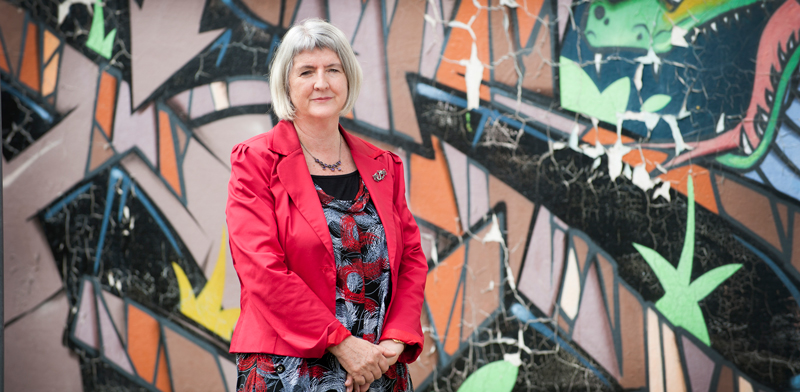Researcher Highlights
Young at heart
Professor Pam Nilan
Professor Pam Nilan contributes a unique sociologist's viewpoint to
the body of research on youth cultures in the Asia-Pacific
region.
It was a trip around Indonesia, Malaysia, Thailand and Singapore in her twenties that ignited Pam Nilan's love affair with Asian culture and society. Fast forward to 2013 and Professor Nilan is fluent in Indonesian and still finds Asia "utterly compelling".
As a youth sociologist with a passion for Indonesia, Professor Pam Nilan has devoted much of her academic career to studying young people both in Australia and abroad and still finds them "infinitely interesting".
"Someone once suggested to me that at my age I should start studying older people - but it is youth and youth culture that excites me," Professor Nilan says.
"I have always been intrigued by the transition from childhood to adulthood - that age where people are still childlike in their openness to new ideas but at the same time socially active and engaging with the world. It is a really interesting cusp that enables them to look backwards and forwards at the same time. I never tire of studying it."
Professor Nilan is currently a Chief Investigator on an ARC Discovery Grant: Fostering Pro-Environment Consciousness and Practice: Environmentalism, Environmentality and Environmental Education in Indonesia.
The project aims to foster environmental awareness in Indonesia by investigating how some people have become environmentally aware, and by evaluating various environmental education and activism projects.
"I've noticed over the past three years more young people are espousing environmental causes in Asia such as rehabilitation of rainforests, preservation of native species, limiting of palm oil plantations and reducing air pollution," Professor Nilan says.
"Young people in Indonesia are quite connected to environmental causes but don't tend to get involved in mass rallies or protests. They use more creative ideas to get their message across, such as making music about environmental causes and forming large teams to conduct 'friendly' clean up campaigns with local councils."
"We're seeing the dawn of a new environmental consciousness in Indonesia with the birth of ideas around cleaning up the local area, taking public transport and riding bikes – it's the reinvention of a new aspect of youth culture," Professor Nilan says.
Youth, gender, formation of identity and popular culture are strong themes in the substantial research portfolio Professor Nilan has amassed, which includes co-authorship of three books on Australian and global youth culture. She also recently co-authored a book on adolesence in Indonesia.
Her love of Southeast Asia and the cultures of the Asia-Pacific region is also reflected in her research work, which has taken her to Indonesia, Vietnam and Fiji to undertake significant sociological studies.
She has also completed a major two-year project funded by AusAID called Masculinities and Violence in Indonesia and India, which followed on from her previous Indonesia-based studies on adolescent culture and masculinities of young men. Pam was a Chief Investigator on the Indonesian component of the study and project leader of the international team of researchers.
"Indonesia and India have histories of civil violence but most of the past research has been around aspects like religiously motivated violence, mass insurgencies or domestic violence - the role of masculinity and its constructions had not been considered," Pam explains.
"We looked at the question of why some men stand back and watch violence and others get involved. To understand that you need to see violence as a form of cultural repertoire, something that can, in certain situations, win respect and bring rewards."
While unemployment and poverty were acknowledged as contributing factors to violence, the research led to some interesting observations on links between low socio-economic status and violence.
"What I have found, both from our data and wider studies, is that there isn't a direct correlation," Pam says. "In areas where everybody is poor, you don't have a high incidence of violence. Where you do see more frequent violence is where there are discrepancies in the socio-economic status of people in the same community - so it is more about inequality of status than poverty per se."
In 2012 she undertook an Australian-embassy sponsored lecture tour through Indonesia with colleague Dr Argyo Demartoto, of Central Java's University Sebelas Maret, to present their findings on masculinity and violence in Indonesia to a wide audience of academics, students, government officials and representatives of aid and development organisations.
Having studied and written on Indonesia since 1995, Professor Nilan's insight into the country is frequently sought by the media and policy makers and she has worked as a consultant to the Australian government and AusAID. Her work brings a unique specialty to FEDUA's research profile - and has fostered academic exchange between students and researchers from Newcastle and Indonesia."Indonesia is a vast, diverse and really fascinating country but it is a country the average Australian still doesn't know a lot about," says Pam, "I think it is important for Australia's role in the region to have people like me who continue to research there and feed knowledge back to the academic community."
The University of Newcastle acknowledges the traditional custodians of the lands within our footprint areas: Awabakal, Darkinjung, Biripai, Worimi, Wonnarua, and Eora Nations. We also pay respect to the wisdom of our Elders past and present.
